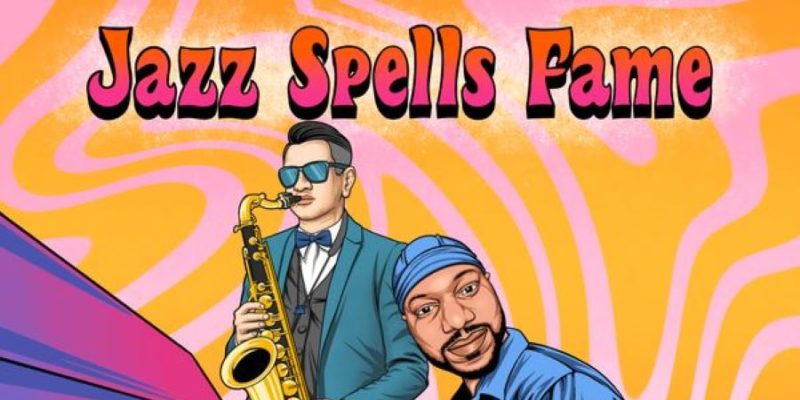2022 brings us Messiah-el Bey’s sophomore solo album, Jazz Spells Fame. It just might for Bey, as it follows on the heels of last year’s Love Kiss Dance single, which got to #6 on the iTunes chart in South Africa.
We kick off with Fenex, and immediately we’re transported back to the lyrical, exploratory soundscapes of 2019’s The Nuyorican Jazz Experience album. It heavily features the brass stylings of this album’s prime collaborator, Ilya Veletsky.
Rich and varied beyond this writer’s ability to universally capture in words, the textures and colours of sound (and the way in which they are blended and mixed together to make a coherent whole) Fenex sets out Bey’s stall mercilessly efficiently.
When I reviewed The Nuyorican Jazz Experience for Stereo Stickman, I mentioned the need to let yourself be washed along by this kind of jazz. And to let that happen without worrying about whether you could effectively dissect it in critical terms. I was worried I wasn’t smart enough to appreciate it. This album puts the listener in the same space.
Discordant moments aren’t for everyone, of course. However, I have always enjoyed the angular moments that can leap out of a piece – probably from the day I heard those 2 notes punch a hole in my consciousness on Tubeway Army’s Are Friends Electric? back in 1979 (you know the ones I mean, right?).
Of course, Bey’s work is nothing like as unsubtle as that – I merely mention it as a prism through which to view/listen to/approach Jazz Spells Fame.

Next up is Sade Said So, a laid-back call back to Life In Mono’s Formica Blues album from 1997 – only with a more modern production sheen, and with a more challenging soundscape. Marimbas and beats and horns swirl and blend and mix with synthesisers that are all vying for attention – and the whole piece pulses and breathes in an organic melting pot that twinkles and shifts to a satisfying, broken down conclusion. It’s stunning.
‘Winston! Winston! You got another woman in our bed?’ So begins The Sexbot Blues! Told from the AI perspective of the robot, this track reminds us of the futuristic, forward-looking nature of Bey’s output and features sung (and automated-sounding) lyrics for the first time. A trumpet burbles and flurries at the edge of the sound, while keyboards ripple and trickle some textures around them.
Rich Latino percussion is always in the wings, too, with soundscape shifts and dynamic steps coming and going in a manner not unlike streaming two music channels at the same time!
Suddenly: Janet’s Ode features skittering drums and puts the piano centre stage. A huge, see-sawing and chaotic canvas rolls through the consciousness with complex brass phrasing and arrangements poking through in both harsh and beautiful clothes.
The unrelenting Frida Kahlo’s Unfinished Song starts and stops, and yet remains on point and driven. As on all tracks, guitars are picking a route through this maelstrom of sound.
Bass picks out an unusual arpeggio at certain points & all the while elements of house & chillout fight for supremacy. Compelling.
Brooklyn Day lends a more traditional-sounding and frenetic energy to proceedings, until the canvas splits open and more esoteric keyboards break out forcing a spacey and serpentine set of voices to dictate direction. It’s all over far too soon, and this listener was left quite breathless.
Nuestra Señora de la Santa Muerte is more laid-back, but there is no peace for the senses or the sensibilities as we are led through some long, held, searching notes that glisten and modulate to the prickle of 808 drums. Again, it’s over way too soon. But maybe that’s the point…
The album concludes with what Bey calls a ‘sequel’ to The Beatles’ Tomorrow Never Knows. It’s a fitting end to an album that is so determinedly forward-looking. Traditional-sounding brass riffing and Branford Marsalis-esque saxophone flourishes team up with electric guitar and all manner of percussion to drift, in an over-driven haze of organ and limber bass to a broken-down and understated ending.
Jazz Spells Fame? Maybe, but here jazz also definitely, defiantly spells jazz.
Visit Messiah’el Bey’s Website for more information.

